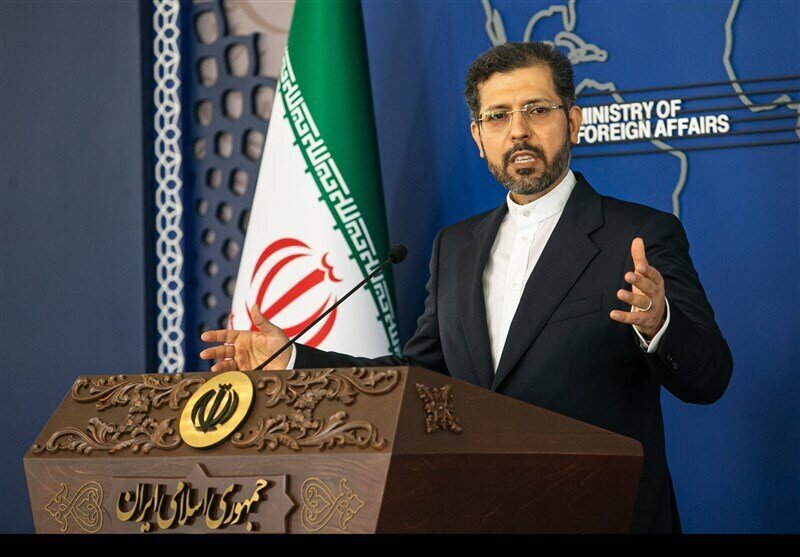

TEHRAN — Speaking at his weekly press briefing on Monday, Iranian Foreign Ministry spokesman Saeed Khatibzadeh said that the Islamic Republic has a strong will to reach a good agreement in Vienna.
“What I am saying is an Iranian narrative. We arrived in Vienna with a strong will and the team was sent to reach a good agreement…in line with the commitments that everyone around us has in the Joint Comprehensive Plan of Action (JCPOA),” Khatibzadeh said.
Iran sent a 40-member strong team to Vienna. In addition to diplomats, it included experts in law, banking, economy, trade, oil, economy, etc.
The talks to lift sanctions were resumed on November 29 and lasted until December 3. However, the Western negotiators called for a halt of the talks to return to their capitals for more consultations.
“The composition of the delegation showed that the main purpose of the delegation was to ensure that the delegation would decide everything in Vienna without round trips to Tehran,” the spokesman noted.
He added that the other side did not expect the Iranian team to give them ready-made written texts with the same approach that a good agreement can be reached in the shortest possible time.
So as soon as these texts were given, some media outlets began saying that the agreement cannot be reached because the Iranian demands were maximalist, Khatibzadeh said.
The talks were resumed after a five-month delay to the presidential elections in Iran in June in which a new government came to power. Six rounds of talks were held until June 20.
“Everything that was written in these texts was based on the JCPOA and the draft negotiated in the six previous rounds and could not have been maximized. Unfortunately, the approach of the United States and the European parties to fulfill their obligations is minimal, and this minimalism has led the negotiations to a point where the European parties immediately asked to return to their capitals and consult,” he stated.
The spokesman continued that the Iranian team announced in Vienna that in order to make a decision, it has the permission to stay in Vienna as long as necessary and reach the necessary agreements based on the texts, but at the insistence of the other side, Iran accepted the need to consult with the capitals.
The talks are being led by the European Union’s Enrique Mora and Iran’s lead negotiator Ali Bagheri Kani.
“The next round will start this weekend and the exact date of the talks between Bagheri and Mora will be finalized soon. It is important that the other side, like Iran, come up with detailed proposals. What we have can certainly be negotiated and examined, but it is a misconception that the other side think it can play a blame game and influence the thoughts of Iranian decision-makers and elites with this game by making media statements.”
The diplomat noted that Iran knows what it wants in Vienna.
“What we want is completely within the framework of the JCPOA. The other side did not find any objections in the Iranian texts and said that it should be examined,” the spokesman reiterated.
He added that Iran is not in a hurry, but it will not allow anyone to play with Tehran’s time and energy in Vienna.
Khatibzadeh also highlighted, “The Iranian delegation entered Vienna with flexibility, but the other side was not like that. We are waiting to receive the other party’s opinion about the two draft proposals. New drafts can be exchanged where necessary. It is important that the talks resume this weekend because the talks have not stopped but have been given a few days off.”
Khatibzadeh said now it is the time for the other side to decide what position to take on lifting the sanctions.
“We do not accept anything less than the JCPOA and we do not commit to anything more than the JCPOA.”
One year after the U.S. quit the JCPOA and the European parties failed to compensate Iran for the U.S. sanctions, Iran started to take gradual compensatory measures based on paragraph 36 of the JCPOA.
“Although we believe that our compensatory measures were taken in response to the other side, it was within the framework of the JCPOA and the issue of sanctions should be settled once and for all. We accepted to work within the framework of flexibility and interaction. We accepted that the second proposal we would present include clauses related to the cessation of Iran’s compensatory measures. What’s most important today is the commitment of the other side. Our commitments are clear, but there are many sanctions that the other side must lift as a stalemate.”
He added in the six rounds of talks conducted before, drafts were prepared, and drafts are subject to negotiations.
“According to the government’s policy, our main and definitive focus is the lifting of sanctions, and we have presented the clauses on lifting the sanctions in the new draft, which is based on the previous draft. No other clauses can be commented on until the benefits of lifting the sanctions are met,” he elaborated.
The spokesman concluded by saying that the people expect the negotiators to have their interests taken into serious and careful consideration.
“The Iranian government is determined to reach a good agreement, and the other side should come to Vienna this weekend with detailed proposals on the texts that Iran has submitted, especially regarding the sections on lifting sanctions,” he noted.
Related posts:
Views: 0
 RSS Feed
RSS Feed

















 December 7th, 2021
December 7th, 2021  Awake Goy
Awake Goy  Posted in
Posted in  Tags:
Tags: 
















